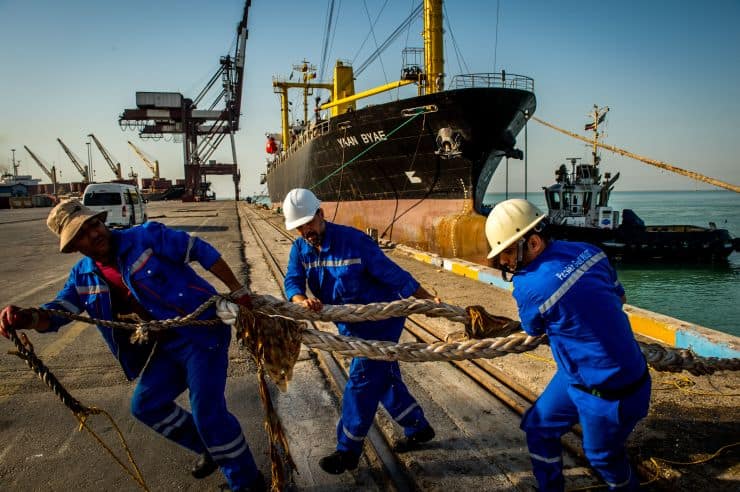
President Donald Trump is threatening to impose “major” new sanctions against Iran on Monday, ramping up the pressure on the Islamic Republic at a time when its economy is straining under the weight of financial restrictions.
Six oil tankers and a U.S. spy drone have been attacked since May either in or near the Strait of Hormuz — the world’s busiest transit lane for seaborne oil shipments that separates Iran from its neighboring Gulf states.
The flurry of attacks has escalated tensions between Washington and Tehran.
On Saturday, Trump said via Twitter that he would impose additional sanctions against Iran in a bid to prevent the country obtaining nuclear weapons. The U.S. already has sanctions on Iran’s oil industry and other sectors.
Trump added that economic pressure would be maintained unless Iran’s leadership changed course.
“We can safely say that Iran’s revenue from oil has been cut by at least two-thirds, so they are in a very dangerous economic position,” Cailin Birch, global economist at the Economist Intelligence Unit, told CNBC’s “Squawk Box Europe ” on Monday.
“They are right to kind of put on a strong face to get themselves out of this conflict, but they are not in a position to fight a war either,” Birch said.
Oil exports
Tensions between the U.S. and Iran have spiked since May 2018, when Trump withdrew from the 2015 nuclear deal and reinstated sweeping sanctions on the country.
The U.S. has also bolstered its military presence in the Middle East and blacklisted Iran’s Revolutionary Guard as a terrorist organization.
Birch estimated that Iran had been exporting between 10 million to 15 million barrels per week in seaborne crude oil exports in the first quarter of the year. Now, this firm sees “nominal volumes” of 4 million to 5 million barrels per week, but half of that was just shuttled in domestic ports, Birch said.
Iran’s oil exports, the government’s main source of revenue, have been hit hard by U.S. sanctions.
Washington has applied financial restrictions to nearly 1,000 Iranian entities, including banks, individuals and vessels tied to the country’s shipping and energy sector. In May, the White House prohibited the purchase of Iranian iron, steel, aluminum and copper.
The Trump administration has also revoked waivers that allowed eight countries, including China and India, to import Iranian oil despite U.S. sanctions. The U.S. is aiming to completely cut off Iranian oil exports in order to force Tehran to abandon support for militant groups in the Middle East and renegotiate the landmark nuclear accord.
Open to talks
Trump approved military strikes against Iran late Thursday in retaliation for the downing of an unmanned American drone, before abruptly reversing his decision, saying the expected casualty toll from a U.S. strike would have been disproportionate to Iran’s downing of an unmanned American spy drone.
He has since said in an interview with NBC News that he does not want war with Iran but, if it comes, there will be “obliteration like you’ve never seen before.”
Amid the escalating tensions, international benchmark Brent crude climbed about 5% last week, while U.S. West Texas Intermediate jumped more than 10% — its biggest gain since December 2016.
Brent crude was trading at around $65.48 on Monday morning, up around 0.4% while U.S. WTI stood at $57.92, almost 1% higher.
Trump has said he remains open to negotiations with Iran, but Supreme Leader Ayatollah Ali Khamenei categorically ruled out talks with the Trump administration.

